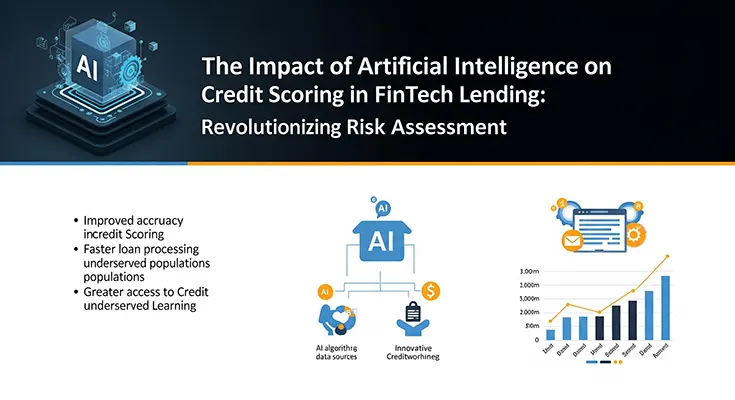In the realm of FinTech lending, the integration of artificial intelligence (AI) into credit scoring processes has ushered in a transformative era, significantly reshaping how financial institutions evaluate creditworthiness and manage lending risk. This article delves into the profound impact of AI on credit scoring within the FinTech lending landscape, underscoring the revolutionary changes it has brought to risk assessment, decision-making, and the overall lending ecosystem.
Evolution of Credit Scoring in FinTech Lending
Traditional Approaches and Limitations
Historically, credit scoring in traditional lending relied on standardized, rule-based models and credit bureau data, which often presented limitations in providing a comprehensive insight into an individual’s creditworthiness. These traditional approaches were constrained by their inability to effectively analyze non-traditional data sources and adapt to dynamic market conditions.
Emergence of AI-Powered Credit Scoring
The advent of AI in credit scoring marked a paradigm shift, empowering FinTech lenders to harness the power of advanced algorithms, machine learning, and predictive analytics to redefine risk assessment. AI’s ability to process vast amounts of data, identify complex patterns, and make real-time decisions has revolutionized the credit evaluation process and unlocked new frontiers in precision and inclusivity.
Key Impacts of AI on Credit Scoring in FinTech Lending
Expanded Data Accessibility and Analysis
AI-driven credit scoring enables FinTech lenders to incorporate a diverse array of data sources beyond traditional credit bureau information, including social media behavior, transaction history, and even psychometric assessments. This expanded data accessibility facilitates a more holistic view of an applicant’s financial behavior and creditworthiness, enhancing the accuracy and depth of risk assessment.
Enhanced Predictive Accuracy and Risk Mitigation
The sophisticated algorithms and predictive modeling capabilities of AI bolster the accuracy of credit scoring, enabling FinTech lenders to more effectively forecast defaults, delinquencies, and overall repayment behavior. By identifying nuanced patterns and correlations, AI-powered credit scoring systems enhance risk mitigation strategies, ultimately leading to more informed lending decisions and reduced credit losses.
Personalized Risk Assessment and Inclusivity
AI’s adaptive nature facilitates personalized risk assessment tailored to individual borrower profiles, thus promoting financial inclusion and addressing underserved segments of the population. By leveraging AI, FinTech lenders can extend credit to those with limited credit histories or unconventional financial footprints, fostering greater accessibility to financial services and promoting economic empowerment.
Streamlined Decision-Making and Efficiency
The automation and real-time capabilities of AI-driven credit scoring streamline the decision-making process for FinTech lenders, significantly reducing the time required for evaluating applications. This enhanced efficiency not only expedites the lending process but also minimizes operational costs, creating a competitive advantage for FinTech lending institutions.
Continuous Learning and Adaptation
AI’s inherent ability to learn and adapt through iterative processes ensures that credit scoring models evolve in tandem with changing market dynamics and borrower behaviors. This adaptability enables FinTech lenders to sustain relevance, capture emergent trends, and refine their risk assessment strategies in response to evolving economic conditions and consumer patterns.
Challenges and Considerations in AI-Powered Credit Scoring
While AI has undeniably revolutionized credit scoring in FinTech lending, it also presents certain challenges and considerations that require prudent management. These include the need for transparency and explainability in AI models, responsible handling of sensitive data, and guarding against algorithmic biases to ensure fairness and equal treatment of all applicants.
The Future Landscape of FinTech Lending: Embracing AI-Driven Innovation
As the FinTech lending industry continues to embrace AI-driven innovation, the influence of AI on credit scoring is poised to redefine the dynamics of risk assessment, lending profitability, and customer relationships. By leveraging AI to unlock deeper, more nuanced insights into creditworthiness, FinTech lenders can chart a path towards a more inclusive, efficient, and resilient lending landscape, ultimately transforming the way financial services are accessed and delivered.
The impact of artificial intelligence on credit scoring in FinTech lending is nothing short of transformative. By empowering lenders to harness massive volumes of data, enhance predictive accuracy, and foster inclusivity, AI has become the cornerstone of a new era in credit assessment. Embracing AI as a catalyst for innovation, the FinTech lending industry can navigate towards a future defined by precision, efficiency, and proactive risk management, propelling financial inclusivity and resilience to unprecedented heights.





